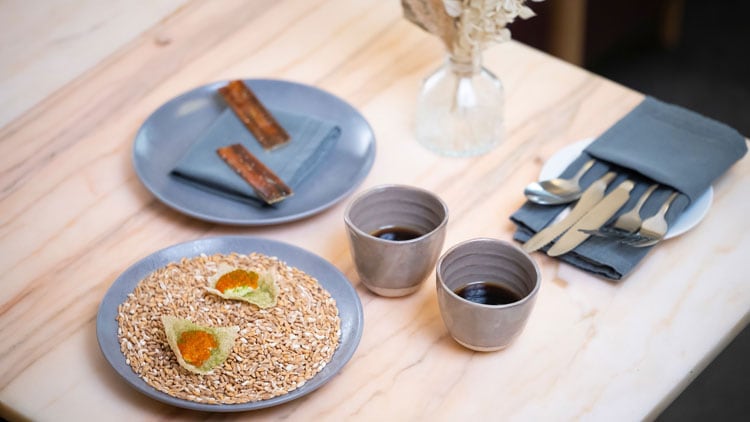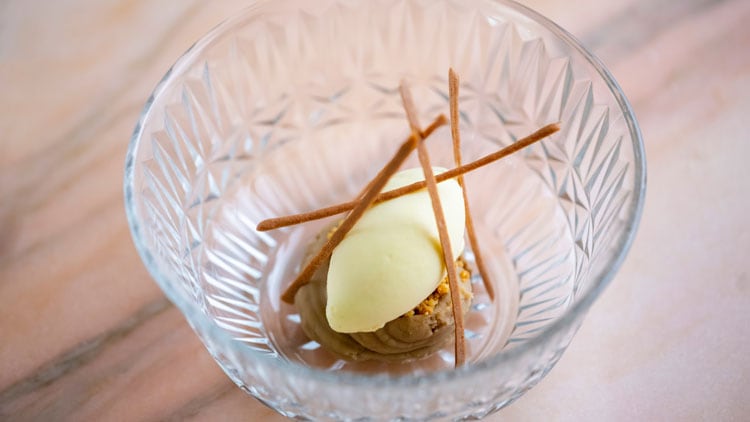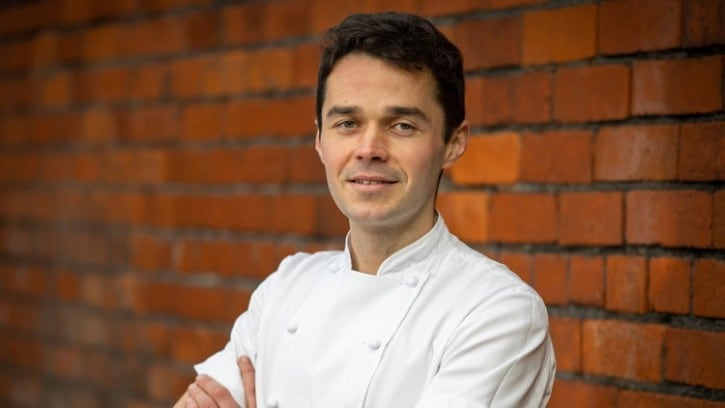How did Gorse come about?
It started as a pop-up that was born out of the circumstances we found ourselves in. I had been working at The Fat Duck and my wife and I decided to move back to Cardiff to open our own restaurant, but the conditions weren’t quite right. It was towards the end of Covid so places were still only partially open. Instead, I started doing pop-ups in cafes and bakeries in the evening. It was initially only a couple of days a month, but it was so popular, and we were selling out every service, so I extended to three days a week - Thursdays, Fridays, and Saturdays. It gained a great following, and I thought the time was right to launch somewhere.
Tell us about the site
It took me about a year to find it. It has 24 covers and is a nice and intimate space, which is great from a quality perspective because I will be able to see and touch every dish that goes out. Also, in the current climate with staffing it’s very manageable. I was cooking at the pop-ups by myself doing 18 covers, which was pretty full on. Gorse will be open for 10 services a week so I can employ two chefs - doing 24 covers with three chefs the quality will be even better than at the pop-ups.

What’s the menu format?
It’s a set menu that will be priced like it was at the pop-ups. We’ll offer a choice of seven or 10 courses, priced at £75 and £100, and also a three-course lunch menu for £35. That’s a nice price point to get people to take a punt on us. In the current climate you might not want to stump up £75 at somewhere you’ve not eaten before so it’s a nice gateway in so show people what we are about and hopefully they will enjoy it and come back for dinner.
Will the food be the same as at the pop-ups?
The way we cook will be the same, but it will be a bit more ambitious, and we will hone in more on the service element. I describe the food as modern Welsh; we take the best ingredients we can from Wales. We have an amazing network of growers, fishermen, farmers, and artisans and we will use this produce that is uniquely from this part of the world. We do respect the heritage of Welsh food but it’s not necessarily replicating Welsh rarebit or stuff like that.
Do you have any signature dishes?
Not really. Our bread was really popular at the pop-ups – it’s a buttermilk brioche roll with some Pembrokeshire seaweed butter – and that’s the only dish that will stay on most of the time, otherwise the menu will change weekly or sometimes even daily depending on what we can get. We work with really small producers; some might have a lamb or even one seabass if they have gone out in a kayak and caught it that day, so we might have to really change it up to support that small network of suppliers. The menu will be quite dynamic, which is exciting.
What’s the Cardiff dining scene like?
It’s come on leaps and bounds in the past five years. There’s some really fantastic restaurants, not just at the higher end but at the mid range, too. There are a lot of people like myself who have gone away, plied their trade at some good restaurants around the country, and then come back to open their own place. There’s definitely an appetite for higher end restaurants in Cardiff as well. The occupancy rate at our pop-ups over the 18 months was 94%, which was pretty amazing, so it shows there is a demand for it.

What did you learn from the pop-ups?
They were really valuable. I served a lot of the dishes personally and so I would chat with the guests, and it was useful to hear what they liked and didn’t like, whether that’s the food or the pace of service or the wine list. It also gave us really good information about the different demographics that were eating with us. The area in which we did the pop-ups mostly is where we are opening permanently because there was such a good local response to it. I would recommend it to any younger chef who wants to open a permanent premises to do it first because it means when you open you’ve got a network of customers and a bit of a brand already going.
Tell us about your career
My route into being a chef was not conventional. I went to university and did a French and German degree. In my year abroad I went to Paris and was eating out a lot and enjoying the amazing food scene there and so I decided to become a chef. As soon as I finished university I wrote to what I considered to be the best restaurants in London and three people wrote back – Bryn Williams [from Odette’s], Rob Weston [La Trompette] and Alyn Williams [Alyn Williams at the Westbury]. I did a stage at all three and ended up working for Bryn for a couple of years. I then worked at The Square under Phil Howard and then moved on to Bonhams to work with Tom Kemble. We then decided to move out of London and I ended up taking a punt and applying to work at The Fat Duck. I was there for three years, joining as chef de partie and leaving as part of the leadership team.
What has your previous experiences taught you as a chef?
The way I conduct myself and my demeanour and the way I work is very much shaped by Brynn, he was the one who taught me right from wrong, how to be a chef and how to work clean, tidily and be organised. From Phil it was definitely flavour and seasonality that drove him at The Square. He understands deliciousness like no other chef I’ve ever met and cooks big bold flavours with finesses. With Tom it was about making produce sing and keeping it simple. At The Fat Duck it was logistics and how to run a monster of a restaurant that’s had three stars for 20 odd years. The attention to detail there and how driven they are in perfecting every dish for every service was amazing. They were also obsessed with how front of house made the guests feel like they were the most important people in the world. Chefs are all guilty of sometimes getting wrapped up in the menu and the food but there’s so much more to it. I was part of a really driven group of people and they had a really different way of looking at food. It’s really important as a chef to have these different experiences.


